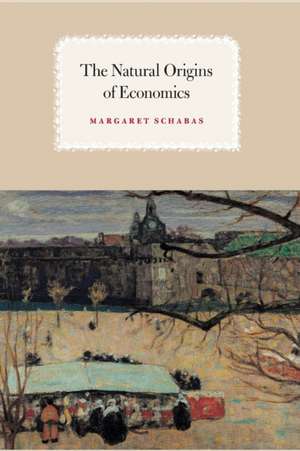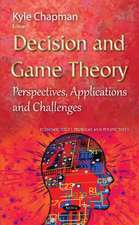The Natural Origins of Economics
Autor Margaret Schabasen Limba Engleză Paperback – 13 sep 2007
References to the economy are ubiquitous in modern life, and virtually every facet of human activity has capitulated to market mechanisms. In the early modern period, however, there was no common perception of the economy, and discourses on money, trade, and commerce treated economic phenomena as properties of physical nature. Only in the early nineteenth century did economists begin to posit and identify the economy as a distinct object, divorcing it from natural processes and attaching it exclusively to human laws and agency.
In The Natural Origins of Economics, Margaret Schabas traces the emergence and transformation of economics in the eighteenth and nineteenth centuries from a natural to a social science. Focusing on the works of several prominent economists—David Hume, Adam Smith, Thomas Malthus, David Ricardo, and John Stuart Mill—Schabas examines their conceptual debt to natural science and thus locates the evolution of economic ideas within the history of science. An ambitious study, The Natural Origins of Economics will be of interest to economists, historians, and philosophers alike.
In The Natural Origins of Economics, Margaret Schabas traces the emergence and transformation of economics in the eighteenth and nineteenth centuries from a natural to a social science. Focusing on the works of several prominent economists—David Hume, Adam Smith, Thomas Malthus, David Ricardo, and John Stuart Mill—Schabas examines their conceptual debt to natural science and thus locates the evolution of economic ideas within the history of science. An ambitious study, The Natural Origins of Economics will be of interest to economists, historians, and philosophers alike.
Preț: 272.91 lei
Nou
Puncte Express: 409
Preț estimativ în valută:
52.22€ • 54.81$ • 43.34£
52.22€ • 54.81$ • 43.34£
Carte tipărită la comandă
Livrare economică 10-24 aprilie
Preluare comenzi: 021 569.72.76
Specificații
ISBN-13: 9780226735702
ISBN-10: 0226735702
Pagini: 244
Dimensiuni: 152 x 229 x 15 mm
Greutate: 0.35 kg
Editura: University of Chicago Press
Colecția University of Chicago Press
ISBN-10: 0226735702
Pagini: 244
Dimensiuni: 152 x 229 x 15 mm
Greutate: 0.35 kg
Editura: University of Chicago Press
Colecția University of Chicago Press
Notă biografică
Margaret Schabas is professor in and head of the Department of Philosophy at the University of British Columbia.
Cuprins
Preface
1. Before "the Economy"
2. Related Themes in the Natural Sciences
3. French Economics in the Enlightenment
4. David Hume
5. Smith's Debts to Nature
6. Classical Political Economy in Its Heyday
7. Mill and the Early Neoclassical Economists
8. Denaturalizing the Economic Order
Notes
References
Index
1. Before "the Economy"
2. Related Themes in the Natural Sciences
3. French Economics in the Enlightenment
4. David Hume
5. Smith's Debts to Nature
6. Classical Political Economy in Its Heyday
7. Mill and the Early Neoclassical Economists
8. Denaturalizing the Economic Order
Notes
References
Index
Recenzii
"Fascinating. . . . . A wide-ranging and challenging book that can be read profitably both by economists and a wider spectrum of readers interested in the history of science."
"Schabas is a gifted writer tackling a dense and difficult subject.She ably packs a sufficient history of economic thought to make her point into less than 160 pages of text.The more than thirty pages of references . . . aptly documents the depth of the echolarship supporting the book."
"It will no longer be possible for historians to discuss early modern economic thought as if the economic domain were autonomous. . . . [The book] proposes a host of fascinating connections between nature and economy, material to awaken our curiosity and to disturb the neat categories we often like to impose on the knowledge of the past."
“This is an essential book for anyone who is interested in understanding the dominant role that the discipline of economics is playing in our current world order. Through her meticulous historical reconstruction, Schabas shows how economists came to see themselves as agents in a human order that they might change for the better, rather than as mere observers of immutable natural laws. In the process, as she also shows, the philosophical ideas of Utilitarianism came to be embedded within the ‘scientific’ discourse of economics, where their controversial normative content escaped people’s notice, as it often still does today. Anyone who wants to challenge this powerful framework needs to begin by understanding it, and Schabas is an exhilarating guide.”--Martha Nussbaum, University of Chicago
"[The book] tells a convincing story about theories of price and value. . . . All the chapters are lucidly written, candidly argued, and illuminating."









